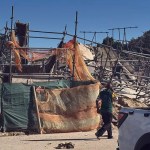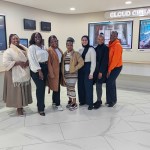SPONSORED CONTENT
Women build bridges, not walls

While women are greatly impacted by conflict, they continue to be excluded from participating in peace negotiations. A research project is training women and identifying opportunities for them to be included in mediation and peacebuilding initiatives. The outcome? More sustainable peace.
Men plan war and go into battle, yet they are also the ones assigned to mediate and keep the peace. The irony does not escape anyone.
Would the outcomes for a conflict-prone continent like Africa be any different if women were included in mediation efforts? Research conducted at the Centre for Mediation in Africa (CMA) at the University of Pretoria suggests they would be.
The research encourages a radical rethinking of peace and mediation, and is based on the life experiences and challenges of African communities. It proposes a mediation style that is grounded in social justice and an African approach when seeking solutions to conflict.
“Many peacekeeping efforts in Africa fail because of international involvement, where pressure is applied to reach agreements and stop the violence, before a peacekeeping force is installed to maintain the cessation of war,” says Dr Sokfa John, Programme Director: Mediation Practice at the CMA.
But, he explains, for many Africans, peace is not just about the end of violence.
“Peace is a lifestyle that is defined by communities – [it involves] living harmoniously with everyone and everything, including their ancestors and the environment.”
Research by the CMA shows that including women who are knowledgeable in traditional systems and approaches that help maintain this harmony and good neighbourly relations will contribute to sustainable peace.
“There is consensus that women are not simply victims of war, but agents of peace as well,” says Dr Quraysha Ismail Sooliman, Programme Director: Public Engagement and Science at the CMA. “In the African context, women have often played an important role as peacemakers and mediators of conflict, particularly at grassroots level, but this has been neglected in official and higher-track mediation.” These tracks are dominated by men.
Read about the University of Pretoria’s most impactful and innovative research
Women’s role in mediation
Historically, women have taken on the mantle of mediator in various African societies, where they wield a certain influence as mothers, elders, traditional healers, or as part of women-only organisations. They tend to steer discussions towards community well-being, education, sustainability, healing and children’s issues. The result is a more comprehensive agreement that achieves greater buy-in from the community with a greater likelihood of lasting peace.
However, the process of involving women as mediators at the highest level has some way to go, Dr Sooliman says.
“While there are many programmes that train women as mediators, women are still largely excluded from the mediation processes in these tracks. Part of our research involves getting these trained women to meaningfully participate as mediators.”
Training is done both online and in person in order to reach a wider constituency, and materials are comprehensive and highly interactive. During the COVID-19 pandemic, a lot of peacebuilding work went digital.
“In this regard, we have been incorporating a digital component to our research,” Dr John says. “The centre’s Director, Professor Cori Wielenga, has been engaging with traditional leaders in southern Africa, as they are at the forefront of mediating conflicts across the continent and are vested in African approaches. These conversations have been filmed and will be used to further our research; this is based on the understanding that it is necessary to listen to what people are saying about their situation and the solutions they envision and seek.”
For Dr Sooliman, this research “returns to the essence of people over profit and politics”. “It is about human dignity and re-evaluating our own lived social frameworks and traditions as tools to drive mediation successes.”
Women are the missing link. DM
Researchers:
Dr Quraysha Ismail Sooliman, Programme Director: Public Engagement and Science, and Dr Sokfa John, Programme Director: Mediation Practice at the Centre for Mediation in Africa in the Department of Political Sciences at the University of Pretoria and postdoctoral fellows at the National Institute for the Humanities and Social Sciences.
















